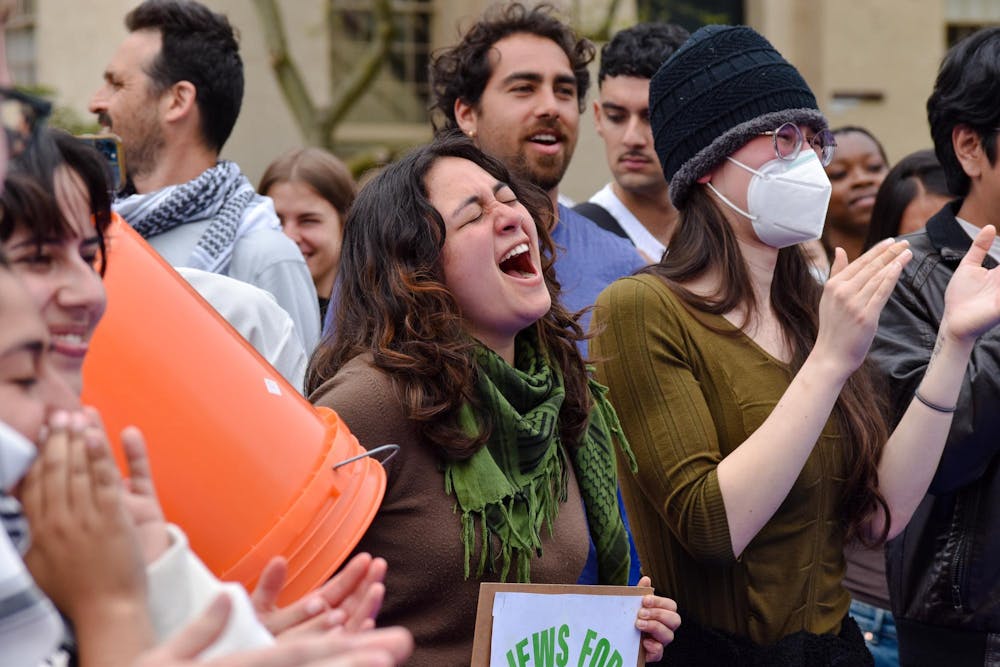The Corporation, Brown’s highest governing body, will vote on divestment from companies affiliated with Israel at its October meeting following an agreement between encampment organizers and University administrators this afternoon. Organizers announced the agreement at a rally.
Organizers have agreed to clear the Main Green encampment by 5 p.m. today and not hold any unauthorized protests through Commencement, which ends May 26. Students in the encampment, which began last Wednesday, have been calling on the University to divest from companies with ties to the Israeli government and drop the charges against the 41 students arrested in a Dec. 11 University Hall sit-in. Charges against the 41 arrested students will not be dropped at this time.
Spokespeople from the University did not immediately respond to a request for comment.
In a Monday letter, President Christina Paxson P’19 P’MD’20 offered to allow student leaders to meet with a small group of Corporation members this May. This initial agreement did not promise to put a discussion or vote on divestment on the Corporation’s agenda. Protestors negotiated the new agreement in meetings held Monday afternoon and Tuesday morning.
According to a copy of the agreement reviewed by The Herald, five students will still meet with at least five Corporation members, including Chancellor Samuel Mencoff ’78 P’11 P’15 and Vice President and Chief Investment Office Jane Dietze, this May.
Students will still face disciplinary proceedings for their involvement in the encampment, the agreement states.
The students will present a divestment proposal based on a 2020 report from the Advisory Committee on Corporation Responsibility in Investment Practices which recommended divestment from “companies that facilitate the Israeli occupation of Palestinian territory.”
ACCRIP, an advisory body that was disassembled in 2020, was tasked with considering the business and investment standards of the University before its replacement by the Advisory Committee on University Resource Management, another body charged to make recommendations on investment practices.
Released during this February’s hunger strike in support of divestment, the “Critical Edition” of the ACCRIP report includes the original report and expanded arguments in favor of divestment from “companies identified as facilitating human rights violations in Palestine.”
Paxson previously refused to bring the 2020 ACCRIP report’s recommendations to the Corporation in a March 2021 letter, writing that “the recommendation did not adequately address the requirements for rigorous analysis and research as laid out in ACCRIP’s charge, nor was there the requisite level of specificity in regard to divestment.”
In a previous interview with The Herald, Paxson said that she would ask ACURM to “fast track” divestment consideration, should a proposal be submitted. But protesters have not submitted a divestment proposal, arguing that the process could “take months — an untenable timeline given the urgency of the crisis in Gaza.”
The new agreement stipulates that student organizers must submit their revised “Critical Edition” of the 2020 ACCRIP report to ACURM no later than September 30, for review by Paxson. A vote on the divestment proposal will occur at the October 2024 Corporation meeting regardless of the outcome of the ACURM review process.
The Tuesday decision marks the culmination of a months-long series of demonstrations calling for divestment from companies affiliated with Israel, including a hunger strike and two University Hall sit-ins that resulted in the arrest of 61 students for trespassing.
The agreement also follows a Thursday special meeting of the Brown University Community Council, an advisory body made up of current undergraduate and graduate students, alumni, faculty, staff, trustees and administrators who make recommendations on University policy.
At this meeting, thirty-one members of BUCC voted to approve two motions in line with protesters’ demands: allowing students to present a divestment proposal to the Corporation and dropping the charges for the 41 students. Both motions passed with 17 “yes” votes, but the second garnered fewer “no” votes and more abstentions.
Prior to the vote, BUCC members met with representatives from the Graduate Labor Organization and the Palestine Solidarity Caucus, an advocacy group of graduate student workers.
GLO “mobilized the community council in the weeks leading up to this vote to take the two motions to the table,” GLO President Sherena Razek GS previously wrote in a message to The Herald. GLO and PSC have organized a myriad of demonstrations this academic year for its stated demands of divestment.
All recommendations by BUCC are non-binding and made in an advisory capacity.
Notably, the agreement between Paxson and demonstrators does not include dropping the charges for 41 students affiliated with Brown Divest Coalition — one of encampment organizers’ key demands.
In a letter to the students participating in the encampment, Paxson wrote that she declined the BUCC’s recommendation to drop the charges, The Herald previously reported. She cited the University's decision not to drop charges against over 250 students who organized a sit-in at University Hall in support of need-blind admissions in 1992.
“I respect the conviction and passion that prompted the students to make the informed choice to be arrested last December,” the letter read. But “the practice of civil disobedience means accepting the consequences of decisions on matters of conscience.”
Three Providence City Council members previously urged the City Solicitor's office to drop the charges against the arrested students, according to a letter published on the Council’s Instagram Monday afternoon. The letter notes that the City Solicitor also has the legal authority to decide whether to drop charges.
Paxson also wrote in her Monday letter that “ending the encampment will make it possible to begin the very involved process of preparing the campus for the tens of thousands of community members who are preparing to travel to participate in the singular milestone of Commencement and Reunion Weekend.”
“Preparations already have been delayed due to the encampment,” she wrote.
In a recent Q&A published by the University, Vice President and Chief Investment Office Jane Dietze said that “given today’s realities, it’s not possible to divest the way Brown did in South Africa or Sudan.”
Dietze referred to increased reliance on external managers, which oversee 96% of Brown’s endowment, as barriers to divestment. Of the 4% of the endowment the University directly invests, none are affiliated with “any of the companies discussed in the current divestment debates,” she said.
While the official dates are not released, the October Corporation meetings historically occur on the third weekend of October.
This story is developing. Check back for updates.

Owen Dahlkamp is a Section Editor overseeing coverage for University News and Science & Research. Hailing from San Diego, CA, he is concentrating in political science and cognitive neuroscience with an interest in data analytics. In his free time, you can find him making spreadsheets at Dave’s Coffee.

Anisha Kumar is a section editor covering University Hall. She is a sophomore from Menlo Park, California concentrating in English and Political Science who loves speed-crosswording and rewatching sitcoms.

Ryan Doherty is a Section Editor covering faculty, higher education and science & research. He is a sophomore concentrating in chemistry and economics who likes to partially complete crosswords in his free time.

Tom Li is a Metro Editor covering the Health & Environment and Development & Infrastructure beats. He is from Pleasanton, California, and is concentrating in Economics and International & Public Affairs. He is an avid RIPTA passenger and enjoys taking (and criticizing) personality tests in his free time.
Avani Ghosh is a Metro Editor covering politics & justice and community & activism. She is a sophomore from Ohio studying Health & Human Biology and International & Public Affairs. She is an avid earl grey enthusiast and can be found making tea in her free time.





